Living with diabetes requires careful attention to diet, exercise, and often medication. Managing blood sugar levels is paramount to preventing complications and maintaining overall health. While dietary adjustments often focus on limiting carbohydrates, the role of protein is equally crucial, especially for those with diabetes.
Protein plays a vital role in satiety, muscle maintenance, and blood sugar regulation, making it an essential component of a diabetic-friendly diet. Protein drinks have emerged as a convenient and effective way for individuals with diabetes to boost their protein intake, manage their weight, and support their overall well-being.
This comprehensive guide will delve into the science behind protein’s benefits for people with diabetes, explore the key factors to consider when choosing the right protein drink, and provide practical advice on how to incorporate these beverages into a balanced diabetic diet and lifestyle.
We’ll discuss the different types of protein, the importance of reading labels, and address common concerns and misconceptions surrounding protein supplementation for diabetes. While we won’t be able to recommend specific products due to missing information, this guide will equip you with the knowledge to make informed decisions and choose the best protein drinks to support your diabetes management plan in consultation with your healthcare provider.
Remember, managing diabetes is a collaborative effort between you and your healthcare team. This guide is intended to provide information and should not be considered medical advice. Always consult with your doctor or a registered dietitian before making significant changes to your diet or exercise routine, especially if you have diabetes.
Table of Contents
The Science of Protein and Diabetes Management:
Protein’s impact on blood sugar regulation and overall health makes it an essential nutrient for people with diabetes. Here’s a detailed look at the science:
Blood Sugar Control:
Protein has a minimal impact on blood sugar levels compared to carbohydrates. It doesn’t cause the rapid spikes and crashes that can be problematic for people with diabetes. In fact, protein can help slow down the absorption of carbohydrates when consumed together, leading to more stable blood sugar levels after meals. This is particularly important for managing post-meal glucose excursions.
Satiety and Weight Management:
Protein is the most satiating macronutrient. It promotes feelings of fullness, which can be particularly beneficial for people with diabetes who are trying to manage their weight. Maintaining a healthy weight is crucial for improving insulin sensitivity and reducing the risk of diabetes-related complications. By increasing satiety, protein can help reduce calorie intake and support weight loss or maintenance efforts.
Muscle Mass Preservation:
People with diabetes are at an increased risk of muscle loss, especially as they age. Adequate protein intake is essential for preserving lean muscle mass. Muscle tissue plays a vital role in glucose metabolism, and maintaining muscle mass can improve insulin sensitivity and blood sugar control. Protein drinks can be a convenient way to ensure you’re getting enough protein to support muscle health.
Improved Insulin Sensitivity:
Some studies suggest that higher protein diets may improve insulin sensitivity, which is crucial for managing type 2 diabetes. When cells are more sensitive to insulin, they are better able to take up glucose from the bloodstream, leading to improved blood sugar control.
Reduced Risk of Heart Disease:
Protein can play a role in reducing the risk of heart disease, a common complication of diabetes. By supporting healthy weight management, improving blood sugar control, and potentially lowering blood pressure, protein contributes to cardiovascular health.
How Much Protein Do You Need with Diabetes?
The general protein recommendation for adults is 0.8 grams of protein per kilogram of body weight. However, for people with diabetes, slightly higher protein intake may be beneficial. A common recommendation is to aim for 1.0 to 1.5 grams of protein per kilogram of body weight. This range can vary based on individual factors such as activity level, kidney function, and overall health status.
It’s essential to consult with your doctor or a registered dietitian to determine the optimal protein intake for your specific needs. They can assess your individual circumstances and provide personalized recommendations. It’s also important to distribute your protein intake throughout the day, aiming for 20-30 grams of protein at each meal and 10-20 grams at snacks.
How to Choose a Protein Drink for Diabetes:
Selecting the right protein drink is crucial for managing diabetes effectively. Here are some key factors to consider:
Addressing Common Concerns and Myths:
Best Protein Drinks for Diabetics: A Comprehensive Guide
Managing diabetes requires careful attention to diet, especially when it comes to protein. Protein can be an excellent tool for stabilizing blood sugar levels, promoting satiety, and aiding in muscle repair.
However, when choosing protein drinks for diabetics, it is essential to focus on options that are low in sugar and high in fiber, as these factors help maintain balanced blood glucose levels. Here’s a detailed list of the best protein drinks that are specifically tailored for people with diabetes, ensuring both nutritional value and taste.
1. Orgain Organic Protein Shake
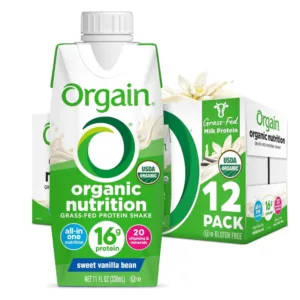
- Calories: 160
- Protein: 26g
- Sugar: 1g
- Fiber: 2g
- Carbs: 15g
- Fat: 4g
- Sodium: 250mg
Orgain Organic Protein Shake stands out for its high protein content and minimal sugar. It provides 26 grams of protein and just 1 gram of sugar, making it an excellent choice for managing blood sugar levels. The added fiber slows carbohydrate absorption, providing a steady source of energy. At 160 calories, it’s perfect as a snack or post-workout drink.
2. Premier Protein Shake
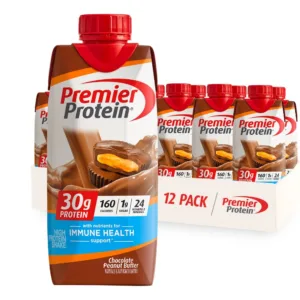
- Calories: 160
- Protein: 30g
- Sugar: 1g
- Fiber: 1g
- Carbs: 4g
- Fat: 3g
- Sodium: 270mg
Premier Protein Shake delivers 30 grams of protein with only 1 gram of sugar. Its low-calorie and low-fat profile make it a great option for a diabetes-friendly diet. The shake is ideal for stabilizing blood sugar levels without contributing to unnecessary weight gain.
3. Evolve Plant-Based Protein Shake
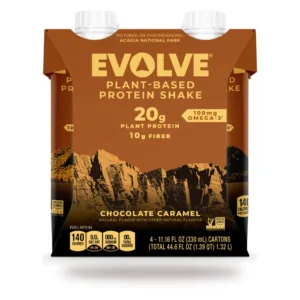
- Calories: 140
- Protein: 20g
- Sugar: 4g
- Fiber: 10g
- Carbs: 15g
- Fat: 1.5g
- Sodium: 220mg
For those seeking a plant-based option, Evolve offers 20 grams of protein and 10 grams of fiber. The added fiber helps regulate blood sugar, making this shake a solid choice for anyone looking to keep their blood glucose levels in check while enjoying a low-calorie, nutrient-dense drink.
4. Fairlife Protein Shake
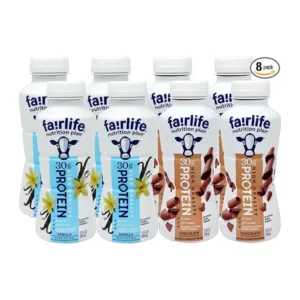
- Calories: 150
- Protein: 30g
- Sugar: 2g
- Fiber: 1g
- Carbs: 4g
- Fat: 2.5g
- Sodium: 230mg
Fairlife’s protein shake is loaded with 30 grams of protein and only 4 grams of carbs. The shake’s low sugar content makes it a great option for diabetics, and it’s also low in fat, helping you manage your overall calorie intake. At just 150 calories, it’s an excellent choice for meal supplementation or a satisfying snack.
5. Aloha Organic Protein Shake
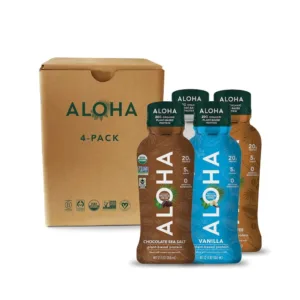
- Calories: 170
- Protein: 20g
- Sugar: 5g
- Fiber: 3g
- Carbs: 11g
- Fat: 5g
- Sodium: 260mg
Aloha’s organic plant-based protein shake combines 20 grams of protein with 3 grams of fiber. While the sugar content is slightly higher, it’s still manageable when paired with a lower-carb snack. The shake is ideal for those who prefer a more balanced, natural option.
6. Kirkland Signature Protein Shake
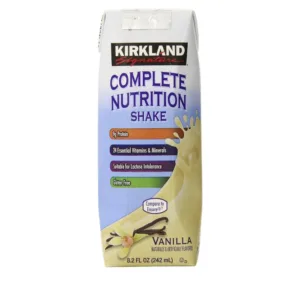
- Calories: 200
- Protein: 15g
- Sugar: 5g
- Fiber: 3g
- Carbs: 22g
- Fat: 6g
- Sodium: 240mg
While Kirkland Signature Protein Shake has slightly higher carbs and sugar compared to others, it’s a filling option at 200 calories. The 3 grams of fiber and 15 grams of protein make it a suitable choice for those who need a more substantial option in their diet, particularly if you’re on insulin and need a controlled source of carbohydrates.
7. Iconic Protein Drink

- Calories: 130
- Protein: 20g
- Sugar: 0g
- Fiber: 4g
- Carbs: 8g
- Fat: 3g
- Sodium: 130mg
Iconic’s protein drink provides 20 grams of protein with zero sugar and a good dose of fiber. This combination makes it one of the best options for avoiding blood sugar spikes. Its low-calorie count (130 calories) and clean profile make it an excellent choice for those who need to keep their blood glucose in check without sacrificing taste or nutrition.
8. Muscle Milk Protein Shake
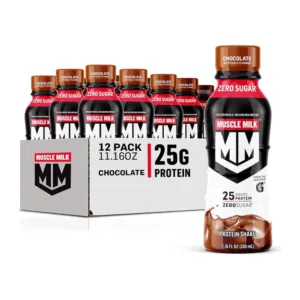
- Calories: 160
- Protein: 25g
- Sugar: 0g
- Fiber: 4g
- Carbs: 7g
- Fat: 4.5g
- Sodium: 90mg
Muscle Milk Protein Shake provides 25 grams of protein and zero sugar, which makes it an excellent choice for diabetics looking to maintain stable blood sugar levels. With 4 grams of fiber, it also aids in digestion and helps you stay full longer. This drink is perfect for post-workout recovery or as a meal supplement.
9. Core Power Fairlife Protein Shake (Chocolate)
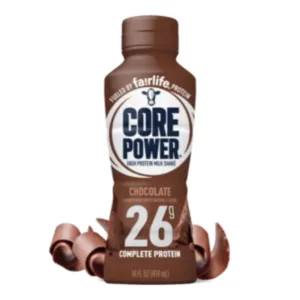
- Calories: 170
- Protein: 26g
- Sugar: 5g
- Fiber: 2g
- Carbs: 8g
- Fat: 4.5g
- Sodium: 260mg
Core Power’s chocolate-flavored protein shake offers 26 grams of protein and 8 grams of carbs. While it has 5 grams of sugar, it’s still a solid option for people with diabetes, especially when paired with fiber-rich snacks. This drink is great for post-workout recovery, providing the nutrients needed to rebuild muscle.
10. Chobani Complete Mixed Berry Protein Drink
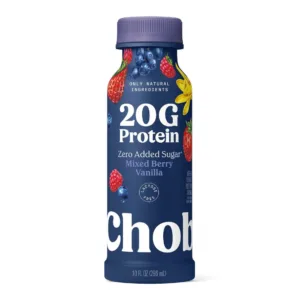
- Calories: 170
- Protein: 20g
- Sugar: 12g
- Fiber: 3g
- Carbs: 16g
- Fat: 2.5g
- Sodium: 120mg
Chobani Complete offers 20 grams of protein and 3 grams of fiber, making it a satisfying drink. Although it contains 12 grams of sugar, the sugar comes naturally from fruit. This makes it a better option for those who prefer natural sweetness. The probiotics in this drink also help support gut health.
11. Nurri Protein Shake
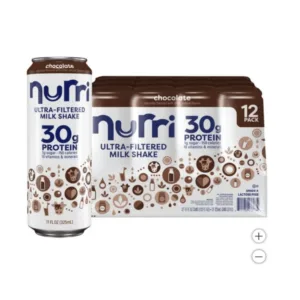
- Calories: 150
- Protein: 30g
- Sugar: 1g
- Fiber: 1g
- Carbs: 3g
- Fat: 2.5g
- Sodium: 250mg
Nurri’s protein shake boasts 30 grams of protein with only 1 gram of sugar. At just 150 calories, this shake is nutrient-dense and helps stabilize blood sugar levels effectively. Its low carbohydrate content makes it an excellent choice for diabetics.
12. OWYN Pro Elite Vegan High Protein Shake
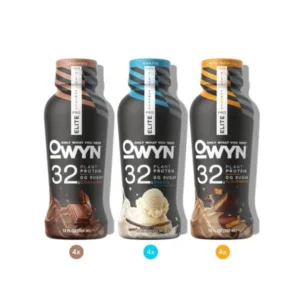
- Calories: 200
- Protein: 32g
- Sugar: 0g
- Fiber: 3g
- Carbs: 3g
- Fat: 7g
- Sodium: 350mg
OWYN’s high-protein shake offers an impressive 32 grams of protein and only 3 grams of carbs. The absence of added sugars and the high fiber content makes it a top choice for diabetics looking for a vegan protein option that helps maintain steady blood sugar levels.
13. Vega Protein Shake
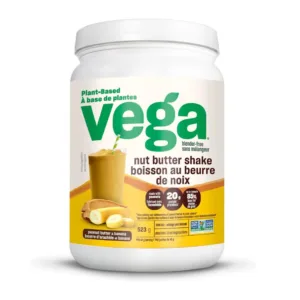
- Calories: 190
- Protein: 30g
- Sugar: 1g
- Fiber: 6g
- Carbs: 15g
- Fat: 5g
- Sodium: 350mg
Vega’s plant-based protein shake is loaded with 30 grams of protein and 6 grams of fiber, making it a filling and blood-sugar-friendly option. The low sugar and moderate carbs make it a solid choice for anyone with diabetes.
14. Tera’s Whey Protein Shake

- Calories: 180
- Protein: 25g
- Sugar: 2g
- Fiber: 2g
- Carbs: 10g
- Fat: 4g
- Sodium: 150mg
Tera’s Whey Protein Shake provides a high amount of protein with minimal sugar. With its clean ingredients and 2 grams of fiber, it helps slow the absorption of sugar, making it suitable for diabetics.
15. Bariatric Advantage Protein Shake
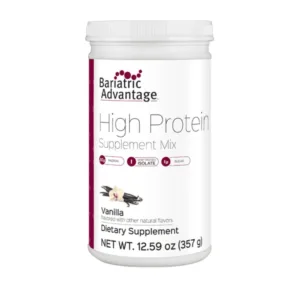
- Calories: 200
- Protein: 27g
- Sugar: 2g
- Fiber: 5g
- Carbs: 15g
- Fat: 6g
- Sodium: 280mg
Bariatric Advantage offers a protein shake that’s particularly suited for those looking to manage their weight and blood sugar. With 27 grams of protein and 5 grams of fiber, it helps maintain stable blood sugar levels.
16. Garden of Life Raw Organic Protein Shake
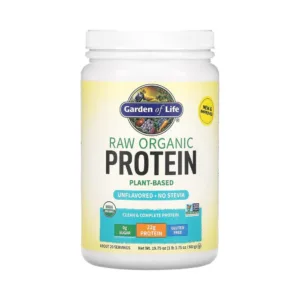
- Calories: 120
- Protein: 22g
- Sugar: 1g
- Fiber: 3g
- Carbs: 9g
- Fat: 2g
- Sodium: 270mg
Garden of Life’s Raw Organic Protein Shake is a low-calorie, nutrient-dense option, offering 22 grams of protein and 3 grams of fiber. The absence of added sugar and the organic certification make it an appealing option for those seeking clean, natural ingredients.
17. Klean Protein Shake
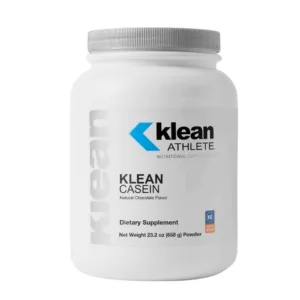
- Calories: 180
- Protein: 20g
- Sugar: 1g
- Fiber: 2g
- Carbs: 15g
- Fat: 5g
- Sodium: 250mg
Klean Protein Shake provides 20 grams of protein and 2 grams of fiber, making it a solid choice for diabetics. Its clean formulation with minimal sugar makes it a great option for maintaining stable blood sugar levels.
18. SlimFast Keto Protein Shake
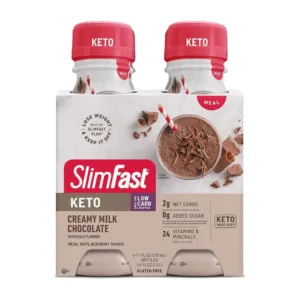
- Calories: 180
- Protein: 15g
- Sugar: 1g
- Fiber: 4g
- Carbs: 8g
- Fat: 12g
- Sodium: 230mg
SlimFast’s Keto Protein Shake provides a low-carb, high-fat option perfect for those on a ketogenic diet or anyone looking to maintain stable blood sugar levels. With 15 grams of protein and 4 grams of fiber, it also offers solid satiety.
19. Dymatize Nutrition Elite Whey Protein Shake

- Calories: 140
- Protein: 25g
- Sugar: 1g
- Fiber: 2g
- Carbs: 3g
- Fat: 3g
- Sodium: 140mg
Dymatize Nutrition’s protein shake is low in sugar and high in protein, making it perfect for diabetics. With 25 grams of protein and minimal carbs, it helps keep blood sugar levels steady.
20. Oatly Oat Drink Protein Shake

- Calories: 160
- Protein: 10g
- Sugar: 7g
- Fiber: 2g
- Carbs: 14g
- Fat: 5g
- Sodium: 120mg
Oatly’s oat-based protein drink is a delicious vegan option. Though it contains some sugar from oats, it provides a good balance of protein and fiber.
21. MusclePharm Combat Protein Shake

- Calories: 150
- Protein: 25g
- Sugar: 2g
- Fiber: 3g
- Carbs: 8g
- Fat: 4g
- Sodium: 250mg
MusclePharm’s Combat Protein Shake is a high-protein, low-carb option that helps stabilize blood sugar while providing nutrients to support muscle growth and recovery.
22. Vital Proteins Collagen Peptides Protein Shake

- Calories: 130
- Protein: 20g
- Sugar: 0g
- Fiber: 0g
- Carbs: 1g
- Fat: 0g
- Sodium: 60mg
Vital Proteins is another excellent protein option for diabetics, offering 20 grams of collagen peptides per serving. This shake supports joint health, skin, and muscle recovery.
23. Pure Protein Shake
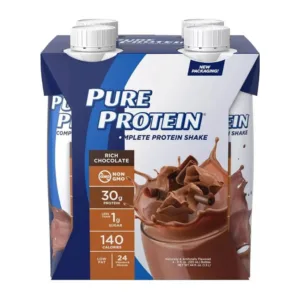
- Calories: 180
- Protein: 30g
- Sugar: 1g
- Fiber: 2g
- Carbs: 6g
- Fat: 3g
- Sodium: 200mg
Pure Protein offers a high-protein shake perfect for those looking to control blood sugar. With 30 grams of protein and low sugar, it’s great for keeping blood sugar steady while feeling full longer.
24. ISO100 Hydrolyzed Protein Shake
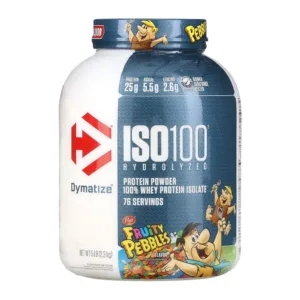
- Calories: 120
- Protein: 25g
- Sugar: 0g
- Fiber: 0g
- Carbs: 2g
- Fat: 1g
- Sodium: 180mg
ISO100 is a great whey protein isolate, providing 25 grams of protein with zero sugar. This shake is great for quick recovery post-workout without affecting your blood sugar levels.
25. Quest Protein Shake

- Calories: 160
- Protein: 30g
- Sugar: 1g
- Fiber: 10g
- Carbs: 5g
- Fat: 5g
- Sodium: 320mg
Quest’s protein shake packs 30 grams of protein and 10 grams of fiber, making it a great choice for those seeking a high-protein, high-fiber drink. It’s particularly beneficial for managing blood sugar while keeping you full longer.
Conclusion
Incorporating protein shakes into a diabetic-friendly diet can be a smart and effective way to maintain stable blood sugar levels, support muscle health, and improve overall nutrition. With the right balance of protein, fiber, and minimal sugar, these shakes can serve as satisfying snacks or meal replacements that aid in blood sugar control and help curb hunger.
However, it’s essential to choose shakes that align with your specific dietary needs, whether you prefer plant-based or whey protein options. Always be mindful of the ingredients, including added sugars and carbohydrates, and consult with your healthcare provider to ensure the shakes fit into your broader health plan.
With a variety of protein shakes available in the market, there’s something to suit every taste and lifestyle. By making informed choices and combining protein shakes with other whole foods, you can effectively manage your diabetes while enjoying a balanced and nutritious diet.
FAQs About Protein Drinks for Diabetics
Are protein shakes safe for people with diabetes?
Yes, protein shakes can be a safe and beneficial addition to a diabetic’s diet. They can help maintain muscle mass, provide steady energy, and support overall nutrition. However, it’s important to choose shakes that are low in sugar, carbs, and fat. Always check the nutritional label and consult your healthcare provider before making any dietary changes.
How do protein shakes help manage blood sugar levels?
Protein helps stabilize blood sugar levels by slowing down the absorption of carbohydrates and preventing spikes in glucose. Additionally, protein can promote satiety, reducing the likelihood of overeating or consuming high-sugar foods that could disrupt blood sugar control.
Should I choose plant-based or whey protein shakes?
Both plant-based and whey protein shakes can be beneficial for diabetics. Plant-based proteins (such as pea or hemp protein) are typically lower in sugar and can be easier on the digestive system for some individuals. Whey protein is rich in essential amino acids and has been shown to help with blood sugar control. Choose the option that best suits your dietary preferences and tolerance.
Can protein shakes replace meals for diabetics?
Protein shakes can serve as a meal replacement in certain situations, such as for a quick breakfast or a post-workout snack. However, it’s important to ensure that the shake provides a balanced nutrient profile, including protein, fiber, healthy fats, and minimal sugar. For a full meal replacement, you may need to combine the shake with other healthy foods to ensure you get a wide range of essential nutrients.
What’s the best time to drink a protein shake for diabetics?
Protein shakes can be consumed at various times throughout the day based on your needs. For example:
Breakfast: To start your day with steady energy and protein.
Post-workout: To support muscle recovery and prevent blood sugar spikes.
Snack: To curb hunger and maintain balanced blood sugar levels between meals. However, it’s important not to rely solely on protein shakes and to maintain a balanced diet with whole foods.
Can I make protein shakes at home for diabetes?
Yes! Homemade protein shakes are a great option as you can control the ingredients and ensure they are low in sugar. Use protein powder (either plant-based or whey) as a base and add unsweetened almond milk, Greek yogurt, spinach, berries, or seeds to increase fiber and nutritional content. Avoid adding sweeteners or high-sugar fruits that may affect blood sugar levels.
Are protein shakes good for weight loss in diabetics?
Protein shakes can aid in weight loss by promoting satiety and reducing overall calorie intake. They can also help preserve lean muscle mass while losing fat. When incorporated into a balanced diet, protein shakes can be part of a weight loss plan, but portion control and monitoring total calorie intake are important. Consult a healthcare professional for personalized advice.
Can protein shakes be consumed by people with type 1 and type 2 diabetes?
Yes, both people with type 1 and type 2 diabetes can benefit from protein shakes. However, it’s essential to monitor carbohydrate intake and choose protein shakes with minimal added sugars. People with type 1 diabetes should adjust their insulin accordingly if they are incorporating protein shakes into their diet.
How do I choose the right protein shake for diabetes?
Look for protein shakes that:
Are low in sugar (less than 5g per serving).
Contain at least 15–30 grams of protein per serving.
Include fiber to help regulate blood sugar.
Have minimal added fats and carbs.
Have a low glycemic index (GI), meaning they won’t cause rapid spikes in blood sugar.
Can protein shakes be used as a supplement or do they replace whole foods?
Protein shakes should generally be used as a supplement, not a replacement for whole foods. Whole foods provide a wider range of essential vitamins, minerals, and other nutrients that may not be present in protein shakes. Protein shakes can be helpful when you’re on the go, recovering from exercise, or as a quick snack.
Can I use protein shakes if I’m taking diabetes medication?
In most cases, protein shakes can be consumed while taking diabetes medication. However, it’s important to monitor your blood sugar levels and adjust your medication as needed. Always discuss any dietary changes with your healthcare provider, especially if you’re on insulin or other medications that affect blood sugar.
Are there any side effects to drinking protein shakes for diabetics?
For most diabetics, protein shakes are safe, but some people may experience digestive discomfort such as bloating or gas, particularly with certain protein types like whey. It’s best to choose a protein source that suits your digestive system. If you experience any adverse reactions, consider switching to another type of protein or adjusting the serving size.
Can protein shakes help with diabetic neuropathy or other complications of diabetes?
While protein shakes can support overall health and wellness, they are not a cure for diabetic neuropathy or other complications. However, maintaining adequate protein intake and managing blood sugar levels can help reduce the risk of complications. Consult your doctor for a comprehensive management plan if you have any diabetes-related health concerns.
How much protein should diabetics consume daily?
The recommended daily protein intake for diabetics varies depending on factors like age, weight, and activity level. Generally, diabetics should aim for 15-30 grams of protein per meal, or around 1.2–1.5 grams of protein per kilogram of body weight, depending on individual health goals and needs. A healthcare provider or dietitian can help tailor protein intake to your specific needs.
Can protein shakes be consumed before bed for diabetics?
Yes, consuming a protein shake before bed can be helpful for diabetics, especially if it includes slow-digesting protein like casein. This helps maintain muscle mass and prevents blood sugar dips overnight. Just be mindful of the carbohydrate and sugar content, ensuring it doesn’t interfere with your blood glucose levels.


Leave a Reply